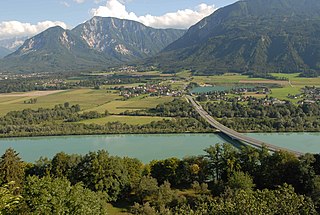
Salzburg is a state (Land) of Austria. It is officially named Land Salzburg, colloquially Salzburgerland, to distinguish it from its eponymous capital Salzburg city and as such is the only state to be named after its capital. By its centuries-long history as an independent Prince-Bishopric, Salzburg's tradition differs from the other Austrian lands.

Klagenfurt am Wörthersee, usually known as just Klagenfurt, is the capital of the federal state of Carinthia in Austria. With a population of 102,138, it is the sixth-largest city in the country. The city is the bishop's seat of the Roman Catholic Diocese of Gurk-Klagenfurt and home to the University of Klagenfurt, the Carinthian University of Applied Sciences and the Gustav Mahler University of Music.

Carinthia is the southernmost Austrian state or Land. Situated within the Eastern Alps, it is noted for its mountains and lakes. The main language is German. Its regional dialects belong to the Southern Bavarian group. Carinthian Slovene dialects, forms of a South Slavic language that predominated in the southeastern part of the region up to the first half of the 20th century, are now spoken by a small minority in the area.

Articles related to Austria include:
The District of Sankt Veit an der Glan is an administrative district in Carinthia, Austria.

Völkermarkt District is an administrative district in the Austrian State of Carinthia.
Below is list of Slovene language exonyms and endonyms for places outside of Slovenia:
Bezirk Villach-Land is a district of the state of Carinthia in Austria.
Bezirk Wolfsberg is a district of the state of Carinthia in Austria.

Magdalensberg is a market town in the district of Klagenfurt-Land in Carinthia in Austria.

Poggersdorf is a municipality, since 2013 a so-called Market Municipality in the district of Klagenfurt-Land in the Austrian federal state of Carinthia.

The 2012 Winter Youth Olympic Games, officially known as the I Winter Youth Olympic Games (YOG), were an international multi-sport event for youths that took place in Innsbruck, on 13–22 January 2012. They were the inaugural Winter Youth Olympics, a major sports and cultural festival celebrated in the tradition of the Olympic Games. Approximately 1100 athletes from 70 countries competed. The decision for Innsbruck to host the Games was announced on 12 December 2008 after mail voting by 105 International Olympic Committee (IOC) members. Innsbruck is the first city to host three winter Olympic events, having previously hosted the 1964 Winter Olympics and the 1976 Winter Olympics.
The Rosen Valley dialect is a Slovene dialect in the Carinthian dialect group. It is spoken in the Rosen Valley of Austria, west of a line from Villach to Faak am See and east of a line from Sittersdorf and Lake Klopein to Brückl, excluding the Ebriach dialect area to the southeast. Settlements in the dialect area include Wernberg, Köstenberg, Velden am Wörthersee, Ludmannsdorf, Köttmannsdorf, Viktring, Grafenstein, Tainach, and Rosegg, and Sankt Jakob im Rosental, Feistritz im Rosental, Windisch Bleiberg, Ferlach, Zell, and Gallizien.

The Battle of Feistritz saw an Imperial French corps led by Paul Grenier attack an Austrian brigade under August von Vécsey. After putting up a stout resistance, the outnumbered Austrians were defeated and forced to retreat. The clash occurred during the War of the Sixth Coalition, part of the Napoleonic Wars. Feistritz im Rosental is located on the right bank of the Drava River near the southern border of Austria, about 16 kilometres (10 mi) southwest of Klagenfurt. At the time, it was located at the border with the French-controlled Illyrian Provinces to its west and south.

A pilgrimage church is a church to which pilgrimages are regularly made, or a church along a pilgrimage route, like the Way of St. James, that is visited by pilgrims.

Prince Johannes of Liechtenstein, was an Austro-Hungarian noble and military leader.
Dob is a Slovene toponym, found in Slovenia, Austria and Italy. It derives from a Proto-Slavic word dǫbъ (oak). The word dob is today used exclusively for Quercus robur, as other oak species have progressively taken other names. Toponyms having their root in the word "dob" are sometimes hard to distinguish from other similar Slovene words —— particularly dober, and dobra, which can be used to refer to many other types of places.
The Rosentalbahn is a mainly Austrian railway that runs from Sankt Veit an der Glan via Klagenfurt and Rosenbach to Jesenice in Slovenia. The section between Rosenbach and Jesenice through the Karawanks Tunnel is part of and international long-distance route between Salzburg and Zagreb. The railway line is operated by the ÖBB. Traffic between Weizelsdorf and Rosenbach was suspended at the commencement 2016/17 timetable change. The line was sold to the state of Carinthia. NBIK heritage trains have been running between Weizelsdorf and Feistritz since the summer of 2020.
This page is based on this
Wikipedia article Text is available under the
CC BY-SA 4.0 license; additional terms may apply.
Images, videos and audio are available under their respective licenses.











